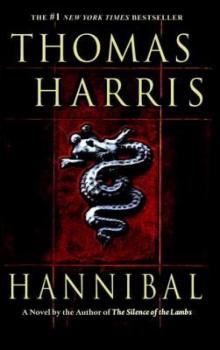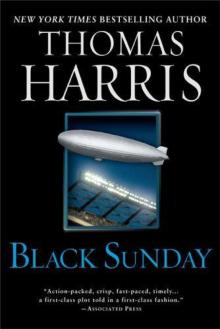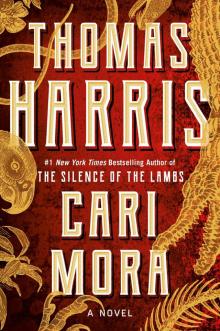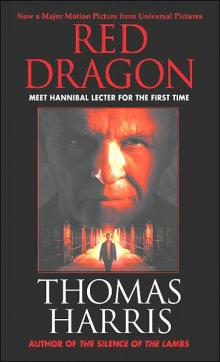- Home
- Thomas Harris
Red Dragon hl-1 Page 19
Red Dragon hl-1 Read online
Page 19
There had been enough delays. The weary courier, his flight fromChicagodelayed by weather and then diverted toPhiladelphia, had rented a car and driven down to the FBI laboratory inWashington.
TheChicagopolice laboratory is efficient, but there are things it is not equipped to do. Zeller prepared to do them now.
At the mass spectrometer he dropped off the paint flecks from Lounds’s car door.
Beverly Katz in Hair and Fiber got the wheels to share with others in the section.
Zeller’s last stop was the small hot room whereLizaLakebent over her gas chromatograph. She was testing ashes from aFloridaarson case, watching the stylus trace its spiky line on the moving graph.
“Ace lighter fluid,” she said. “That’s what he lit it with.” She had looked at so many samples that she could distinguish brands without searching through the manual.
Zeller took his eyes offLizaLakeand rebuked himself severely for feeling pleasure in the office. He cleared his throat and held up the two shiny paint cans.
“Chicago?” she said.
Zeller nodded.
She checked the condition of the cans and the seal of the lids. One can contained ashes from the wheelchair; the other, charred material from Lounds.
“How long has it been in the cans?”
“Six hours anyway,” Zeller said.
“I’ll headspace it.”
She pierced the lid with a heavy-duty syringe, extracted air that had been confined with the ashes, and injected the air directly into the gas chromatograph. She made minute adjustments. As the sample moved along the machine’s five-hundred-foot column, the stylus jiggled on the wide graph paper.
“Unleaded…” she said. “It’s gasohol, unleaded gasohol. Don’t see much of that.” She flipped quickly through a looseleaf file of sample graphs. “I can’t give you a brand yet. Let me do it with pentane and I’ll get back to you.”
“Good,” Zeller said. Pentane would dissolve the fluids in the ashes, then fractionate early in the chromatograph, leaving the fluids for fine analysis.
* * *
By one A.M. Zeller had all he could get.
LizaLakesucceeded in naming the gasohol: Freddy Lounds was burned with a “Servco Supreme” blend.
Patient brushing in the grooves of the wheelchair treads yielded two kinds of carpet fiber—wool and synthetic. Mold in dirt from the treads indicated the chair had been stored in a cool, dark place.
The other results were less satisfactory. The paint flecks were not original factory paint. Blasted in the mass spectrometer and compared with the national automotive paint file, the paint proved to be high-quality Duco enamel manufactured in a lot of 186,000 gallons during the first quarter of 1978 for sale to several auto-paintshop chains.
Zeller had hoped to pinpoint a make of vehicle and the approximate time of manufacture.
He telexed the results toChicago.
TheChicagopolice department wanted its wheels back. The wheels made an awkward package for the courier. Zeller put written lab reports in his pouch along with mail and a package that had come for Graham.
“Federal Express I’m not,” the courier said when he was sure Zeller couldn’t hear him.
* * *
The Justice Department maintains several small apartments near Seventh District Court inChicagofor the use of jurists and favored expert witnesses when court is in session. Graham stayed in one of these, with Crawford across the hall.
He came in at nine P.M., tired and wet. He had not eaten since breakfast on the plane fromWashingtonand the thought of food repelled him.
Rainy Wednesday was over at last. It was as bad a day as he could remember.
With Lounds dead, it seemed likely that he was next and all dayChesterhad watched his back; while he was in Lounds’s garage, while he stood in the rain on the scorched pavement where Lounds was burned. With strobe lights flashing in his face, he told the press he was “grieved at the loss of his friend Frederick Lounds.”
He was going to the funeral, too. So were a number of federal agents and police, in the hope that the killer would come to see Graham grieve.
Actually he felt nothing he could name, just cold nausea and an occasional wave of sickly exhilaration that he had not burned to death instead of Lounds.
It seemed to Graham that he had learned nothing in forty years: he had just gotten tired.
He made a big martini and drank it while he undressed. He had another after his shower while he watched the news.
(“An FBI trap to catch the Tooth Fairy backfires and a veteran reporter is dead. We’ll be back with details on Eyewitness News after this.”)
They were referring to the killer as “the Dragon” before the news-cast was over. The Tattler had spilled it all to the networks. Grahain wasn’t surprised. Thursday’s edition should sell well.
He made a third martini and called Molly.
She had seen the television news at six and ten o’clock and she had seen a Tattler. She knew that Graham had been the bait in a trap.
“You should have told me, Will.”
“Maybe. I don’t think so.”
“Will he try to kill you now?”
“Sooner or later. It would be hard for him now, since I’m moving around. I’m covered all the time, Molly, and he knows it. I’ll be okay.”
“You sound a little slurry, have you been to see your friend in the fridge?”
“I had a couple.”
“How do you feel?”
“Fairly rotten.”
“The news said the FBI didn’t have any protection for the reporter.”
“He was supposed to be with Crawford by the time the Tooth Fairy got the paper.”
“The news is calling him the Dragon now.”
“That’s what he calls himself.”
“Will, there’s something… I want to take Willy and leave here.”
“And go where?”
“His grandparents’. They haven’t seen him in a while, they’d like to see him.”
“Oh, um-hmm.”
Willy’s father’s parents had a ranch on theOregoncoast.
“It’s creepy here. I know it’s supposed to be safe—but we’re not sleeping a whole lot. Maybe the shooting lessons spooked me, I don’t know.”
“I’m sorry, Molly.” I wish I could tell you how sorry.
“I’ll miss you. We both will.”
So she had made up her mind.
“When are you going?”
“In the morning.”
“What about the shop?”
“Evelyn wants to take it. I’ll underwrite the fall stuff with the wholesalers, just for the interest, and she can keep what she makes.”
“The dogs?”
“I asked her to call the county, Will. I’m sorry, but maybe somebody will take some of them.”
“Molly, I—”
“If staying here I could keep something bad from happening to you, I’d stay. But you can’t save anybody, Will, I’m not helping you here. With us up there, you can just think about taking care of yourself. I’m not carrying this damned pistol the rest of my life, Will.”
“Maybe you can get down toOaklandand watch the A’s.” Didn’t mean to say that. Oh boy, this silence is getting pretty long.
“Well, look, I’ll call you,” she said, “or I guess you’ll have to call me up there.”
Graham felt something tearing. He felt short of breath. “Let me get the office to make the arrangements. Have you made a reservation already?”
“I didn’t use my name. I thought maybe the newspapers…”
“Good. Good. Let me get somebody to see you off. You wouldn’t have to board through the gate, and you’d get out ofWashingtonabsolutely clean. Can I do that? Let me do that. What time does the plane go?”
“Nine-forty. American 118.”
“Okay, eight-thirty… behind the Smithsonian. There’s a Park-Rite. Leave the car there. Somebody’ll meet you. He’ll listen to his watch, put it to his e
ar when he gets out of his car, okay?”
“That’s fine.”
“Say, do you change at O’Hare? I could come out—”
“No. Change inMinneapolis.”
“Oh, Molly. Maybe I could come up there and get you when it’s over?”
“That would be very nice.”
Very nice.
“Do you have enough money?”
“The bank’s wiring me some.”
“What?”
“To Barclay’s at the airport. Don’t worry.”
“I’ll miss you.”
“Me too, but that’ll be the same as now. Same distance by phone. Willy says hi.”
“Hi to Willy.”
“Be careful, darling.”
She had never called him darling before. He didn’t care for it. He didn’t care for new names; darling, Red Dragon.
The night-duty officer inWashingtonwas glad to make the arrangements for Molly. Graham pressed his face to the cool window and watched sheets of rain whip over the muffled traffic below him, the street leaping from gray to sudden color in the lightning flashes. His face left a print of forehead, nose, lips, and chin on the glass.
Molly was gone.
The day was over and there was only the night to face, and the lipless voice accusing him.
Lounds’s woman held what was left of his hand until it was over.
“Hello, this is Valerie Leeds. I’m sorry I can’t come to the phone right now…”
“I’m sorry too,” Graham said.
Graham filled his glass again and sat at the table by the window, staring at the empty chair across from him. He stared until the space in the opposite chair assumed a man-shape filled with dark and swarming motes, a presence like a shadow on suspended dust. He tried to make the image coalesce, to see a face. It would not move, had no countenance but, faceless, faced him with palpable attention.
“I know it’s tough,” Graham said. He was intensely drunk. “You’ve got to try to stop, just hold off until we find you. If you’ve got to do something, fuck, come after me. I don’t give a shit. It’ll be better after that. They’ve got some things now to help you make it stop. To help you stop wanting to so bad. Help me. Help me a little. Molly’s gone, old Freddy’s dead. It’s you and me now, sport.” He leaned across the table, his hand extended to touch, and the presence was gone.
Graham put his head down on the table, his cheek on his arm. He could see the print of his forehead, nose, mouth, and chin on the window as the lightning flashed behind it; a face with drops crawling through it down the glass. Eyeless. A face full of rain.
Graham had tried hard to understand the Dragon.
At times, in the breathing silence of the victims’ houses, the very spaces the Dragon had moved through tried to speak.
Sometimes Graham felt close to him. A feeling he remembered from other investigations had settled over him in recent days: the taunting sense that he and the Dragon were doing the same things at various times of the day, that there were parallels in the quotidian details of their lives. Somewhere the Dragon was eating, or showering, or sleeping at the same time he did.
Graham tried hard to know him. He tried to see him past the blinding glint of slides and vials, beneath the lines of police reports, tried to see his face through the louvers of print. He tried as hard as he knew how.
But to begin to understand the dragon, to hear the cold drips in his darkness, to watch the world through his red haze, Graham would have had to see things he could never see, and he would have had to fly through time…
Chapter 25
Springfield, Missouri, June 14, 1938.
Marian Dolarhyde Trevane, tired and in pain, got out of a taxi atCityHospital. Hot wind whipped grit against her ankles as she climbed the steps. The suitcase she lugged was better than her loose wash dress, and so was the mesh evening bag she pressed to her swollen belly. She had two quarters and a dime in her bag. She had Francis Dolarhyde in her belly.
She told the admitting officer her name was Betty Johnson, a lie. She said her husband was a musician, but she did not know his whereabouts, which was true.
They put her in the charity section of the maternity ward. She did not look at the patients on either side of her. She looked across the aisle at the soles of feet.
In four hours she was taken to the delivery room, where Francis Dolarhyde was born. The obstetrician remarked that he looked “more like a leaf-nosed bat than a baby,” another truth. He was born with bilateral fissures in his upper lip and in his hard and soft palates. The center section of his mouth was unanchored and protruded. His nose was flat.
The hospital supervisors decided not to show him to his mother immediately. They waited to see if the infant could survive without oxygen. They put him in a bed at the rear of the infant ward and faced him away from the viewing window. He could breathe, but he could not feed. With his palate cleft, he could not suck.
His crying on the first day was not as continuous as that of a heroin-addicted baby, but it was as piercing.
By the afternoon of the second day a thin keening was all he could produce.
When the shifts changed at three P.M., a wide shadow fell across his bed. Prince Easter Mize, 260 pounds, cleaning woman and aide in the maternity ward, stood looking at him, her arms folded on top of her bosom. In twenty-six years in the nursery she had seen about thirty-nine thousand infants. This one would live if he ate.
Prince Easter had received no instructions from the Lord about letting this infant die. She doubted that the hospital had received any either. She took from her pocket a rubber stopper pierced with a curved glass drinking straw. She pushed the stopper into a bottle of milk. She could hold the baby and support his head in one great hand. She held him to her breast until she knew he felt her heartbeat. Then she flipped him over and popped the tube down his throat. He took about two ounces and went to sleep.
“Um-hum,” she said. She put him down and went about her assigned duties with the diaper pails.
* * *
On the fourth day the nurses moved Marian Dolarhyde Trevane to a private room. Hollyhocks left over from a previous occupant were in an enamel pitcher on the washstand. They had held up pretty well.
Marian was a handsome girl and the puffiness was leaving her face. She looked at the doctor when he started talking to her, his hand on her shoulder. She could smell strong soap on his hand and she thought about the crinkles at the corners of his eyes until she realized what he was saying. Then she closed her eyes and did not open them while they brought the baby in.
Finally she looked. They shut the door when she screamed. Then they gave her a shot.
On the fifth day she left the hospital alone. She didn’t know where to go. She could never go home again; her mother had made that clear.
Marian Dolarhyde Trevane counted the steps between the light poles. Each time she passed three poles, she sat on the suitcase to rest. At least she had the suitcase. In every town there was a pawn shop near the bus station. She had learned that traveling with her husband.
Springfieldin 1938 was not a center for plastic surgery. InSpringfield, you wore your face as it was.
A surgeon at City Hospital did the best he could for Francis Dolarhyde, first retracting the front section of his mouth with an elastic band, then closing the clefts in his lip by a rectangular flap technique that is now outmoded. The cosmetic results were not good.
The surgeon had troubled to read up on the problem and decided, correctly, that repair of the infant’s hard palate should wait until he was five. To operate sooner would distort the growth of his face.
A local dentist volunteered to make an obturator; which plugged the baby’s palate and permitted him to feed without flooding his nose.
The infant went to the Springfield Foundling Home for a year and a half and then to Morgan Lee Memorial Orphanage.
Reverend S. B. “Buddy” Lomax was head of the orphanage. Brother Buddy called the other boys and girls together and t
old them that Francis was a harelip but they must be careful never to call him a harelip.
Brother Buddy suggested they pray for him.
* * *
Francis Dolarhyde’s mother learned to take care of herself in the years following his birth.
Marian Dolarhyde first found a job typing in the office of a ward boss in theSt. LouisDemocratic machine. With his help she had her marriage to the absent Mr. Trevane annulled.
There was no mention of a child in the annulment proceedings.
She had nothing to do with her mother. (“I didn’t raise you to slut for that Irish trash” were Mrs. Dolarhyde’s parting words to Marian when she left home with Trevane.)
Marian’s ex-husband called her once at the office. Sober and pious, he told her he had been saved and wanted to know if he, Marian, and the child he “never had the joy of knowing” might make a new life together. He sounded broke.
Marian told him the child was born dead and she hung up.
He showed up drunk at her boardinghouse with his suitcase.
When she told him to go away, he observed that it was her fault the marriage failed and the child was stillborn. He expressed doubt that the child was his.
In a rage Marian Dolarhyde told Michael Trevane exactly what he had fathered and told him he was welcome to it. She reminded him that there were two cleft palates in the Trevane family.
She put him in the street and told him never to call her again. He didn’t. But years later, drunk and brooding over Marian’s rich new husband and her fine life, he did call Marian’s mother.
He told Mrs. Dolarhyde about the deformed child and said her snag teeth proved the hereditary fault lay with the Dolarhydes.
A week later aKansas Citystreetcar cut Michael Trevane in two.
When Trevane told Mrs. Dolarhyde that Marian had a hidden son, she sat up most of the night. Tall and lean in her rocker, Grandmother Dolarhyde stared into the fire. Toward dawn she began a slow and purposeful rocking.
Somewhere upstairs in the big house, a cracked voice called out of sleep. The floor above Grandmother Dolarhyde creaked as someone shuffled toward the bathroom.

 The Silence of the Lambs
The Silence of the Lambs Red Dragon
Red Dragon Hannibal
Hannibal Black Sunday
Black Sunday Cari Mora
Cari Mora Hannibal Rising
Hannibal Rising Red Dragon hl-1
Red Dragon hl-1 The Silence of the Lambs (Hannibal Lecter)
The Silence of the Lambs (Hannibal Lecter)